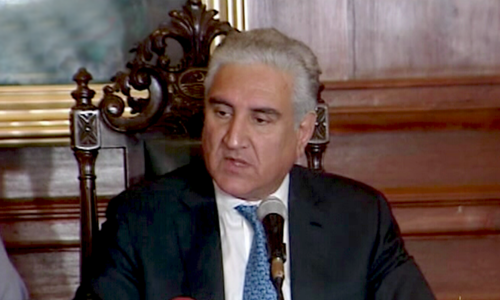Following the escalation of tensions between the United States and Iran, Foreign Minister Shah Mahmood Qureshi on Sunday arrived in Mashhad, Iran for a visit, Radio Pakistan reported.
Qureshi was welcomed by Mashhad Governor General Khurasan-Razavi on his arrival. The foreign minister was accompanied by Foreign Secretary Sohail Mahmood and other senior officials of the foreign ministry.
During his visit, Qureshi visited Imam Reza's shrine where he prayed for the unity and solidarity of the Muslim ummah, the report said.
The foreign minister is also scheduled to visit Tehran to meet his Iranian counterpart to exchange views on the current situation in the region, Radio Pakistan added.
Qureshi is also expected to visit Riyadh tomorrow to hold talks with Saudi Foreign Minister Prince Faisal bin Farhan Al Saud.
Qureshi's trip comes after Prime Minister Imran Khan on Wednesday instructed him to visit Iran, Saudi Arabia and the United States and meet with respective foreign ministers, and the US secretary of state in light of the situation in the region.
On Wednesday, the United States and Iran came to the brink of war after Iran launched missile attacks on US-led forces in Iraq, in retaliation for the US drone strike on Iranian commander Qasem Soleimani whose killing has raised fears of a wider war in the Middle East.
The situation de-escalated after US President Donald Trump, while delivering a televised address, extended an olive branch to the "people and leaders" of Iran to work together for "shared priorities". In the same breath, he announced more "punishing" economic sanctions against Tehran.
According to a curtain raiser for the trip, issued by the Foreign Office, Qureshi will meet with his Iranian counterpart Javad Zarif in Tehran and exchange views on the "evolving situation in the Middle East/Gulf region".
Following his visit to Iran, Qureshi will travel to Riyadh on January 13 where he will meet with Saudi Arabia's Foreign Minister Faisal bin Farhan Al-Saud and hold talks on "issues of regional peace and stability".
As per the FO, Qureshi will share "Pakistan's perspective on the current situation, stress the imperative of avoiding any conflict, underscore the importance of defusion of tensions, and stress the need for finding a diplomatic way forward".
"The foreign minister will convey Pakistan’s readiness to support all efforts that facilitate resolution of differences and disputes through political and diplomatic means," the statement added.
According to a diplomatic source, following his visit to Tehran and Riyadh, the foreign minister will travel to Washington on January 17.
Pakistan offers to mediate
Qureshi has made numerous phone calls with his counterparts over the situation. Most recently, he spoke to the Russian and Iraqi foreign ministers.
Pakistan and Russia agreed to launch joint efforts to restore peace in the region, Radio Pakistan reported on Friday.
In a phone call between Qureshi and Russian Foreign Minister Sergei Lavrov, the two leaders discussed issues relating to the escalation of tensions in the Middle East as well as the overall situation in the region, the report added.
The same day, the foreign minister also discussed the US-Iran tensions in a phone call with Iraqi Foreign Minister Mohamed Ali al-Hakim.
Qureshi during the conversation said that the region could not afford a new war and reiterated the need for all parties to resolve issues through dialogue under UN Security Council resolutions and international laws.
Prime Minister Imran Khan has offered to mediate between US and Iran while emphasising that Pakistan will not become part to anyone else’s war but will try to resolve differences between warring states.
Meanwhile, Chief of Army Staff Gen Qamar Javed Bajwa was asked by the premier to call upon all concerned parties in the dangerously escalating conflict between US and Iran to "avoid rhetoric in favour of diplomatic engagement".
On Wednesday, Gen Bajwa called upon all concerned parties in the dangerously escalating conflict between US and Iran to "avoid rhetoric in favour of diplomatic engagement".
A statement issued by the Inter-Services Public Relations (ISPR) said that the army chief had received a phone call from US Secretary of Defence Mark T. Esper during which the ongoing tensions in the Middle East were discussed.














































